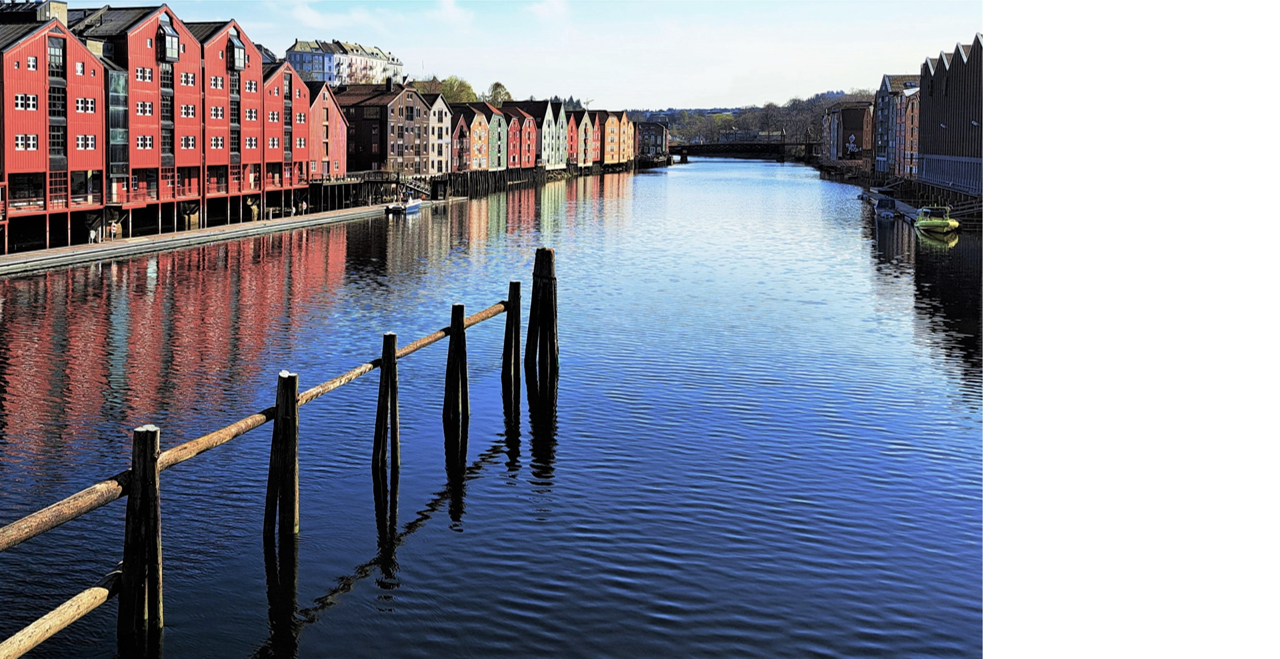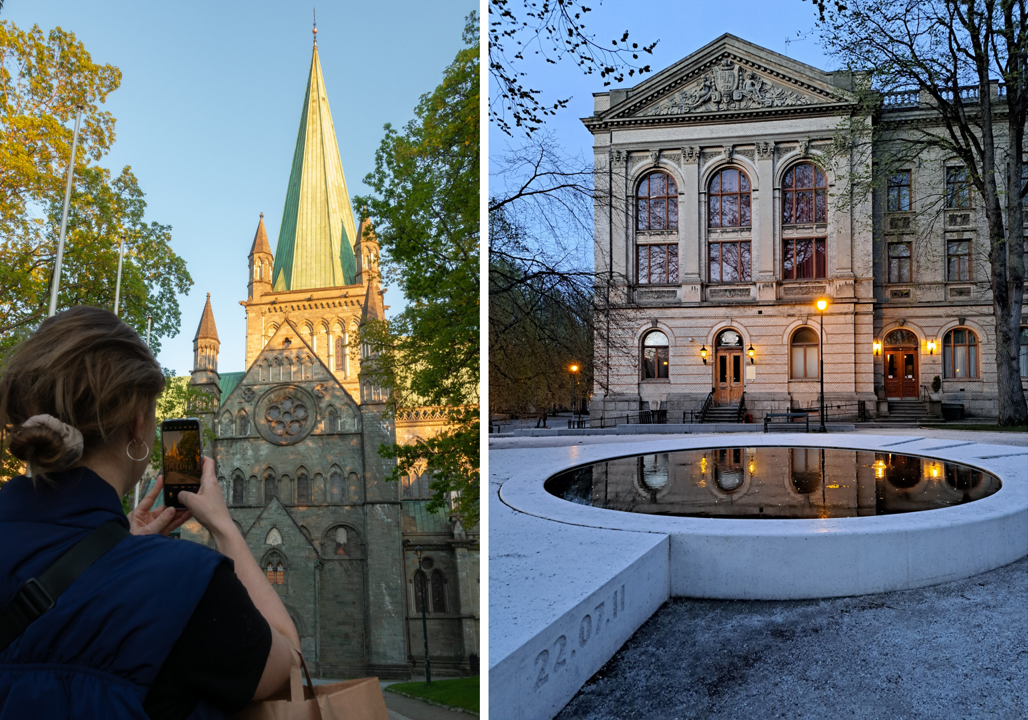
Colourful wooden wharves in the Bakklandet neighborhood. Photo by Anna Derksen.
At the end of May, our international network gathered at the NTNU Trondheim for our annual workshop on the topic of “Resonant Conflicts: Turning Points in the Baltic Sea Region”. Our time was split over three days between highly concentrated working sessions and relaxed opportunities to make new professional connections, learn about the rich history of Trondheim, and enjoy the late sunsets in striking settings. We used the time to welcome ten new doctoral researchers into our network and (re-)connect with international associated researchers and fellows.
Following a warm welcome by Prof. Lars August Fodstad, head of the Department of Language and Literature at NTNU (our hosts), and the organizers from Trondheim and Greifswald, the first two days of the workshop were dedicated to presentations by the new cohort of doctoral researchers, who started at the IRTG in Greifswald at the beginning of April and were thus in very early stages of their projects. The workshop offered the opportunity to discuss possible directions, introduce methodologies, clarify concepts, and present sources. The ten doctoral project pitches were organized thematically into panels according to overarching topics, including memory politics, gender studies, narratives of identity, literature, and artistic expression through photography and graphic novels, which revealed many connections between projects, both expected and unexpected. The panels were moderated by doctoral researchers from the first cohort, as well as other IRTG members, which established a collegial atmosphere and encouraged lively discussions following each presentation. We were also happy to welcome our Mercator Fellow, Prof. Em. Laura Assmuth (University of Eastern Finland), as well as colleagues from the University of Tartu, who offered thought-provoking commentary.

Special guests: local fauna in our workshop room at NTNU Trondheim. Photos by Anna Derksen.
The workshop was particularly useful in its function as a meeting of multiple disciplines: The interdisciplinary nature of our research group, as well as the international network, makes for a rich grouping of perspectives that challenge and deepen each project. The workshop thus offered the space for conversations that were not only productive for the individual researchers, but also as a general discussion of methodology and how concepts may be challenged and developed by applying them to different contexts. Our focus on peripety and turning point takes on different shapes in different disciplines, which encourages more detailed and active consideration of concepts, as case studies may reveal limits or challenges to the utility of a concept. On the second day of the workshop, the supervisory board members from Trondheim, Tartu, and Greifswald presented their respective research foci, including literature, memory and museum studies, cultural studies, history, politics, and philosophy. Moreover, the presenters highlighted how their research thematizes peripety and neighbouring concepts in various ways. A particular focus was placed on the topicality of peripeties in the Baltic Sea region and the effects that acute challenges like Russia’s war against Ukraine have on international relations, memory discourses, or literary and rhetorical explorations of crises, instability, and temporal experience.
The Keynote Lecture was given by Prof. Tore Vagn Lid (Trondheim/Bergen) on “The Dramaturgy of the State of Exception: Reflections from– and through (Stage) Art”. Presenting his recent theatrical work on the terrorist attacks in Oslo and a Workers’ Youth League summer camp on the island of Utøya on July 22, 2011, he discussed, in particular, his dramaturgical choices in staging a reconstruction of the attacks, thereby exploring the meaning of emergency and exception through an artistic process. By calling into question the historicisation of the attacks, as well as media and political narratives surrounding the way the attacks have been processed in Norwegian society, his lecture initiated multiple interesting points of discussion regarding the representation of turning points and events in the Baltic Sea region, not least the issue of temporality in the construction of narratives.

The art historical city tours led us past iconic buildings like Nidaros Cathedral, and had us pause at the memorial to the victims of the terror attacks of July 22, 2011. Left photo by Jan Reinicke, right photo by Anna Derksen.
On the final day of the workshop, both our doctoral researchers and supervisory board engaged in intensive writing sessions with Pam Bromley, Ph.D. (Scripps College). This was an opportunity to collaboratively work on current research texts, and to consider how writing strategies contribute to research processes. For the doctoral researchers, this proved to be another valuable opportunity to receive feedback and to practice sharing texts at different stages.
The academic program was enriched with activities that allowed us to explore the city of Trondheim. On the first day, an Academic World Café was organized as a way to encourage more casual chats about projects. We had all attendees self-organize into small groups with variation in position, field, and home university, with each group having at least one local expert. Each group then chose a route and went for a stroll through the city, or found a nice place to sit and get to know each other. This broke up the highly-structured atmosphere of a workshop to allow for more organic networking, and used the setting of Trondheim to its full advantage. On the second and third days, we were also treated to a guided historical tour of the city center, focused around the architecture of religious and governmental buildings. Our guide, Prof. Margrethe Cecilia Molland Stang (Trondheim), shared her art history expertise with us and gave a fascinating overview of Trondheim’s medieval and early modern history, as well as pointing out more contemporary monuments and sights.

Picturesque views such as the historical bridge over the river Nidelva or the marina at the Trondheim Fjord were a stimulating backdrop for more informal discussions and exchange. Photos by Anna Derksen.
We would like to warmly thank our hosts in Trondheim, in particular Prof. Ingvild Folkvord, Prof. Jan Süselbeck and Assoc-Prof. Silje Haugen Warberg, for making possible a workshop that was not only productive and intellectually stimulating, but also enjoyable. Our coordination team and research students put in valuable hard work to make sure the workshop ran smoothly. We also thank the staff of the NTNU Trondheim for providing us with the space for the workshop and providing delicious coffee, tea, and local specialty snacks during our coffee breaks. We look forward to our next gathering, which is planned for 2025 in Tartu.



